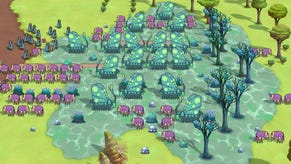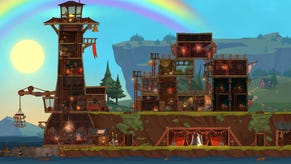Sundays are for sleeping in til midday, before rising to gather the finest articles about flapping birds the internet can provide. What will make us all angry next week, I wonder?
Let's do all the Flappy Birds articles first. Brendon Keogh writes about the problem with innovation, and does some rare work towards understanding what makes Flappy Bird a fun game to play. "There’s a slapstick, black humor to it – a morbid desperation. Mechanically, this translates into the game’s difficulty. In most flying games, it’s possible to find an equilibrium as your flaps turn into something resembling gliding. Not here. Flap too little and you plummet; flap too much and you’ll bang your head on the pipe. You must compensate for overcompensation."
Mattie Brice writes in Our Flappy Dystopia about capitalism, colonialism and outsiders. "Most indie games strive to be addictive entertainment just like AAA ones do and employ similar kinds of people with a shared background. Indies can stay because they don’t threaten how big business works; instead, they merged right in with it. To this industry, using those green pipes was sacrilege, with the horrific possibility that, in Jason’s words, “some kids might grow up thinking these are ‘Flappy Bird pipes.’” What, exactly, is so bad about that?"
Mammon Machine takes the long road, looking at the press's response and responsibility within the Flappy Bird saga. "In contrast to how much has been written to extract meaning for any and all events surrounding Flappy Bird, Kotaku’s carefully-not-actually-an-apology ends with a series of befuddled questions, as if the reasons for Dong Nguyen taking down the game had become a cosmic mystery. “Was it the badgering he got by the press that turned things sour?” as if nothing could be more ambiguous than the involvement of the press."
Still hunger for more words about striving aves? The Flappy Bird Think Pieces tumblr gathers links to more, albeit it with mean-spirited intent. Always be overthinking.
A brief pause for a couple of my own thoughts. i) Flappy Bird was a rare thing: a videogame which caused enough controversy to energise the broader world of gaming writers - mainstream, alternative, everyone - to write about it. Within that, I wish there had been more writing about the game itself. I think there's actual value in Flappy Bird as an object, separate from its developer, the culture, the response. Process stories; words about the words in response to the words about the game. For that reason, I still like Ian Bogost's piece the best, because it's centered on analysing the experience of playing Flappy Bird, rather than our response to it or its success. ii) My best score is 93. Beat that!
Related: Jeff Vogel writes about Why Indie Developers Go Insane. "I've been doing this for a long time, and I have a pretty thick skin. Even then, this stuff has an effect. You can't help it. It's part of being human. One angry message has more effect than ten friendly ones. It has a real psychic weight. And, once you know it's there, turning off your computer and avoiding Twitter doesn't remove it."
Not-games, not-a-games, ungames; they're all kinds of videogame, as valid and interesting as anything with a score multiplier. I dislike anything which tries to shrink the borders and exclude certain types of experience. If you tell me that dogs are videogames, I wouldn't disagree. I'd think, great, let's see what dogs can do. Is my approach limiting in itself? Joel Goodwin spoke to Dan Pinchbeck and Ed Key about whether they'd rather not have the "game" label, in two parts.
Game Informer go to lengths to chart how LucasArts came to a shabby end. A lot of this is a summary of things we already knew, but there's more on the fate of 1313. "One of Lucas’ most crushing curveballs came weeks before the game was announced. He didn’t want the protagonist to be a fresh face; he wanted it to be Boba Fett. Without any working Boba Fett assets ready for the announcement, the team members who unveiled the project to the press during 2012’s Electronic Entertainment Expo, had to play dumb. They lied when asked directly about it, unable to mention anything about the iconic bounty hunter being the lead."
This is excellent. Polygon profile Dan Shea, a gun expert and collector who works with the videogame industry to make its weaponry as accurate as possible. "Walking around the vault with Shea is like walking around the world and back in time. There are weapons here from North Korea and China, from Israel and Iraq, from Germany and Africa. Being allowed into this room implies a kind of trust, and not just because of the lock on the door. I am being entrusted with the stories behind these guns. Many were used in battle and are each surrounded by history, and by loss."
Related: A year ago, American Vice President Joe Biden sat down with the videogame industry to talk about the medium and its links to gun violence. Issues were raised, plans were made. A year later, Mike Rose at Gamasutra looks into what has happened since.
The boys of the Regular Features podcast show you how to seduce a gamer.
This'll take you the rest of the week: the videos of the talks from the Steam Dev Days conference are now online. Advice from experience.
Chris Livingston continues to capture wonderful DayZ moments via his Hey Are You Cool tumblr. This past week he stumbled across a hostage situation and recorded the overheard conversation. It's compelling, a little sad and worth watching right to the very end.
Jason Shiga has a new comic! Don't know why you should care? Read this old comic.
Reader James Morgan wrote in to suggest his sister's band Mountainear for this week's music recommendation. Good thing, because it's good. And its video is a bit LARPy.









